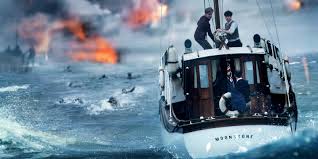By Laurie Coker
Rating: A
Together director Christopher Nolan and longtime collaborator composer Han Zimmer have created the perfect blend of visual intensity and musical majesty in movie making. Dunkirk, set during World War II when allied troupes were desperately in need of evacuation as Nazi forces pushed them closer and closer to the sea, starts powerfully from the moment the film rolls and never lets the audience out of its grip until final credits roll. Nolan, who also penned the script, has created a riveting tale of bravery, determination, and honor in the wake of complete futility.
No single actor stars in Dunkirk, but Tom Hardy, Kenneth Branagh and Mark Rylance and an exceptional ensemble cast impress. Nolan manages to weave a story that overlaps and turns between time, scenes and characters without losing one touch of intensity. Unlike other war films, Dunkirk is not about a bloody battle, but rather about evacuation from it. Against all odd, unexpected heroes emerge and the British troupes persevere. Bullets and bombs do fly and characters die, but the focus is on the events of one fateful day and night. No gratuitous gore.
Calling a war film beautiful seems almost inappropriate, but this one is. Every moment mesmerizes. It is perceptive and personal and it is intimate and epic. The story is not linear and the effect increases the suspense and the strength of its story. Champions emerge and lives are lost. Its plot is primal and raw and Nolan knows how to capture his audience – within the first few tense minutes propaganda flyers flutter to the ground and into hands of soldiers like soft snowflakes predicting a blizzard. “We surround you,” the leaflets announce – ominous arrows pointing to the tiny beach at Dunkirk. A single soldier runs through the streets exiting onto the sand riddled with wounded and exhausted men. From there the film continues at a powerful and passionate pace.
While based on true events, the characters offered up by Nolan are fictitious. There were 400,000 men stranded in Dunkirk and the Royal Navy resorted to using civilian boats to rescue soldiers – traveling nearly 40 nautical miles (two hours) from England to France across the English channel. The British Army, Navy and the Air Force all went to the aid of these men, but so did noncombatants. Historically over 350,000 were rescued thanks to military and civilian efforts. Even though not apparent to the men on the beach, pilots in spitfire fighter planes protected them from German planes off shore.
Exploding bombs, quickly sinking ships, edgy spitfire fights and fiery waters will engross action-thriller fans, but Nolan dips deeper, subtly engaging and igniting feelings. Relentlessly, Nolan blasts his audience with bullets, explosives and other brutalities of battle all the while pulling at visceral emotions. It is almost as if from the first moment we take a breath and do not let it out until the finale. Sequences are both nerve-wracking and poignant. There is a paradox between the magnificence and beauty of the film and brutality of the event it depicts. The men on Dunkirk beach are basically fish in a barrel – add pilots caught in cockpits of sinking planes, men trapped below in descending destroyers, a small group’s attempt to drift out in a beached trawler while under fire and a private boat captain and his son racing to evacuate as many as possible and the mix is utterly jarring.
Han Zimmer deserves special notice in Dunkirk. His score adds to the film in a way that no star could. It lives, weaving like a raging and waning river through Nolan’s telling of a terrifying and troubling time in history. Together Nolan and Zimmer create a passionate fluidity that resonates hours after watching its 105 spectacular minutes. Dunkirk deserves an A. It is one of the best pictures of the year so far.
